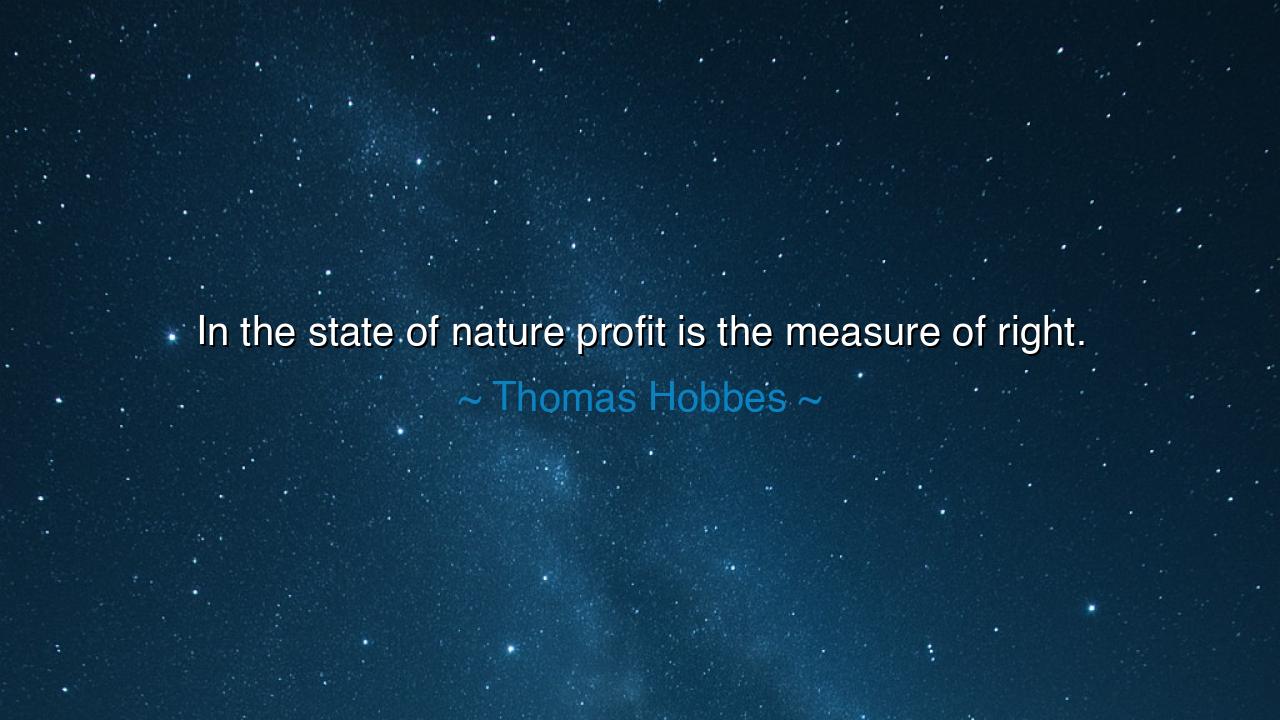
In the state of nature profit is the measure of right.






Hear now the ancient wisdom clothed in the words of Thomas Hobbes, who declared: “In the state of nature profit is the measure of right.” This saying springs forth from his vision of a world stripped bare of law, custom, and king—a world where man lives as he first did, untamed, with no shield of covenant or throne to bind his hand. In such a realm, there is no justice but survival, no law but gain, no right but that which brings profit to the one who dares to claim it. His words are both warning and revelation, for they show us what humanity becomes when the higher bonds of society and morality are torn away.
Consider well the meaning of the state of nature. It is not the garden of peace that some philosophers imagine, but a storm of desire and fear, where every man sees in his brother a rival, and in the world around him a quarry for his taking. There, right is not given by crown, nor sanctified by parchment, but weighed by what can be grasped and kept. To Hobbes, profit—not in the narrow sense of coin, but in the broad sense of advantage, survival, and gain—is the only rule of power. What one can seize, one may call his own; what one cannot defend, one must surrender.
History itself testifies to this truth. Recall the fall of Rome, when no emperor held sway, and the once-great order crumbled into warring tribes. In those dark centuries, might was the measure, and profit the sole justification of action. If a chieftain conquered new land, his conquest was deemed “right,” for no higher power could say otherwise. Justice bent before the sword, and law was but the echo of the strongest will. So too in Hobbes’ vision: when man is left alone without covenant, his hand will turn to profit, and profit will become his law.
Yet, O children of reflection, do not think this teaching is only a curse. In revealing the darkness of man’s nature, Hobbes points us also toward the light. For if in the state of nature profit alone defines right, then it is by covenant, by union, and by common agreement that men escape that chaos. In banding together under law and sovereign, they rise above the brutal arithmetic of advantage. By recognizing this grim reality, Hobbes urges us to cherish the bonds of society, for without them, man is cast adrift in a sea of endless struggle.
Consider the example of the Mayflower pilgrims, who landed in a strange and untamed land. Before them lay the wilderness—no king, no court, no law but what they would make. Had each sought only his own profit, the colony would have devoured itself. Yet they signed the Mayflower Compact, binding themselves to a common good. By covenant, they escaped the Hobbesian state, turning profit from a private weapon into a shared survival. Thus, what could have been chaos became the seed of a nation.
The lesson is clear: man must never forget what lies beneath the thin veil of civilization. When order is absent, profit becomes the only judge, and mercy gives way to hunger. Therefore, guard the bonds of law, community, and trust, for they are the ramparts that keep us from descending into that ancient war of all against all.
And here is practical counsel: live not as one who takes profit as his sole measure of right, but as one who tempers advantage with virtue. Strive to see beyond your own gain, and honor the agreements, laws, and covenants that bind you to others. Build communities rooted in trust, not mere advantage, for when trust reigns, profit becomes not the measure of right, but the servant of the common good.
So remember, O listener: Hobbes shows us the abyss so that we may flee it. To live only by profit is to live as beasts; to live by covenant is to live as men. Choose the higher path, and you shall not only survive, but flourish.






AAdministratorAdministrator
Welcome, honored guests. Please leave a comment, we will respond soon